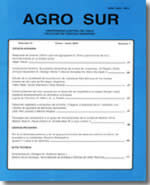Characterization and classification of the white lupin (Lupinus albus L.) providers in the IXth Region of Chile for the company «Productos Nutritivos AVELUP Ltda.» through multi-variant analysis
Main Article Content
Abstract
This study was conducted to characterize a group of farmers that are contracted to provide white lupin (Lupinus albus L, cv. Rumbo) to the company AVELUP Limited. A static survey was conducted to gather productive, technical and economic variables, including lupin yield and quality. The data were analyzed using descriptive statistics and a Factorial Analysis of Multiple Correspondences was utilized to classify the farmers. An analysis of Conglomerates was also conducted to confirm these results.
This study was centred on a group of 45 farmers in the Ninth Region of Chile and the data showed a large heterogeneity in the sample, in technical characteristics, economics of production and quality, both between farmers and production systems. Strengths, weaknesses, opportunities and threats perceived by the farmers were also identified in this study.
The Factorial Analysis of Multiple Correspondences identified three types of farmer, differing in terms of the following variables: method of acquisition of information with regard to production methods, the area sown with lupin, lupin yield, gross revenues, criteria for herbicide use against wide and narrow leaf weeds, strengths and weaknesses. On the basis of these variables, farmers were classified as «very good», «average» and «bad», each one with characteristics that affected their economic results.

